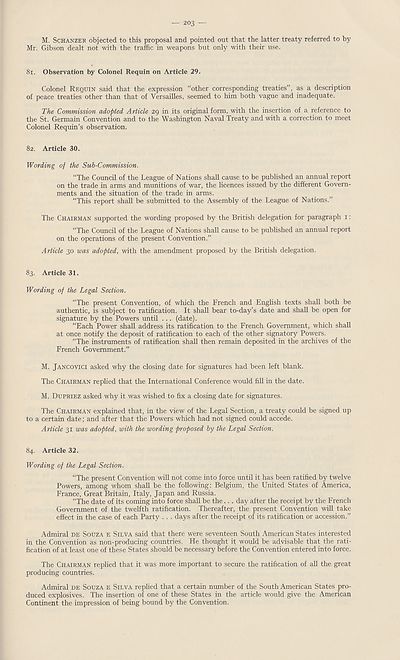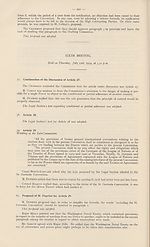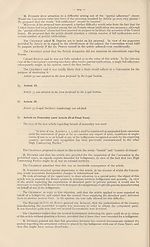Armament > Conference for the control of the international trade in arms, munitions and implements of war
(205)
Download files
Complete book:
Individual page:
Thumbnail gallery: Grid view | List view

— 203 —
M. Schanzer objected to this proposal and pointed out that the latter treaty referred to by
Mr. Gibson dealt not with the traffic in weapons but only with their use.
81. Observation by Colonel Requin on Article 29.
Colonel Requin said that the expression “other corresponding treaties”, as a description
of peace treaties other than that of Versailles, seemed to him both vague and inadequate.
The Commission adopted Article 29 in its original form, with the insertion of a reference to
the St. Germain Convention and to the Washington Naval Treaty and with a correction to meet
Colonel Requin’s observation.
82. Article 30.
Wording of the Sub-Commission.
“The Council of the League of Nations shall cause to be published an annual report
on the trade in arms and munitions of war, the licences issued by the different Govern¬
ments and the situation of the trade in arms.
“This report shall be submitted to the Assembly of the League of Nations.”
The Chairman supported the wording proposed by the British delegation for paragraph 1:
“The Council of the League of Nations shall cause to be published an annual report
on the operations of the present Convention.”
Article 30 was adopted, with the amendment proposed by the British delegation.
83. Article 31.
Wording of the Legal Section.
“The present Convention, of which the French and English texts shall both be
authentic, is subject to ratification. It shall bear to-day’s date and shall be open for
signature by the Powers until ... (date).
“Each Power shall address its ratification to the French Government, which shall
at once notify the deposit of ratification to each of the other signatory Powers.
“The instruments of ratification shall then remain deposited in the archives of the
French Government.”
M. Jancovici asked why the closing date for signatures had been left blank.
The Chairman replied that the International Conference would fill in the date.
M. Dupriez asked why it was wished to fix a closing date for signatures.
The Chairman explained that, in the view of the Legal Section, a treaty could be signed up
to a certain date; and after that the Powers which had not signed could accede.
Article 31 was adopted, with the wording proposed by the Legal Section.
84. Article 32.
Wording of the Legal Section.
“The present Convention will not come into force until it has been ratified by twelve
Powers, among whom shall be the following: Belgium, the United States of America,
France, Great Britain, Italy, Japan and Russia.
“The date of its coming into force shall be the.. . day after the receipt by the French
Government of the twelfth ratification. Thereafter, the present Convention will take
effect in the case of each Party . . . days after the receipt of its ratification or accession.”
Admiral de Souza e Silva said that there were seventeen South American States interested
in the Convention as non-producing countries. He thought it would be advisable that the rati¬
fication of at least one of these States should be necessary before the Convention entered into force.
The Chairman replied that it was more important to secure the ratification of all the great
producing countries.
Admiral de Souza e Silva replied that a certain number of the South American States pro¬
duced explosives. The insertion of one of these States in the article would give the American
Continent the impression of being bound by the Convention.
M. Schanzer objected to this proposal and pointed out that the latter treaty referred to by
Mr. Gibson dealt not with the traffic in weapons but only with their use.
81. Observation by Colonel Requin on Article 29.
Colonel Requin said that the expression “other corresponding treaties”, as a description
of peace treaties other than that of Versailles, seemed to him both vague and inadequate.
The Commission adopted Article 29 in its original form, with the insertion of a reference to
the St. Germain Convention and to the Washington Naval Treaty and with a correction to meet
Colonel Requin’s observation.
82. Article 30.
Wording of the Sub-Commission.
“The Council of the League of Nations shall cause to be published an annual report
on the trade in arms and munitions of war, the licences issued by the different Govern¬
ments and the situation of the trade in arms.
“This report shall be submitted to the Assembly of the League of Nations.”
The Chairman supported the wording proposed by the British delegation for paragraph 1:
“The Council of the League of Nations shall cause to be published an annual report
on the operations of the present Convention.”
Article 30 was adopted, with the amendment proposed by the British delegation.
83. Article 31.
Wording of the Legal Section.
“The present Convention, of which the French and English texts shall both be
authentic, is subject to ratification. It shall bear to-day’s date and shall be open for
signature by the Powers until ... (date).
“Each Power shall address its ratification to the French Government, which shall
at once notify the deposit of ratification to each of the other signatory Powers.
“The instruments of ratification shall then remain deposited in the archives of the
French Government.”
M. Jancovici asked why the closing date for signatures had been left blank.
The Chairman replied that the International Conference would fill in the date.
M. Dupriez asked why it was wished to fix a closing date for signatures.
The Chairman explained that, in the view of the Legal Section, a treaty could be signed up
to a certain date; and after that the Powers which had not signed could accede.
Article 31 was adopted, with the wording proposed by the Legal Section.
84. Article 32.
Wording of the Legal Section.
“The present Convention will not come into force until it has been ratified by twelve
Powers, among whom shall be the following: Belgium, the United States of America,
France, Great Britain, Italy, Japan and Russia.
“The date of its coming into force shall be the.. . day after the receipt by the French
Government of the twelfth ratification. Thereafter, the present Convention will take
effect in the case of each Party . . . days after the receipt of its ratification or accession.”
Admiral de Souza e Silva said that there were seventeen South American States interested
in the Convention as non-producing countries. He thought it would be advisable that the rati¬
fication of at least one of these States should be necessary before the Convention entered into force.
The Chairman replied that it was more important to secure the ratification of all the great
producing countries.
Admiral de Souza e Silva replied that a certain number of the South American States pro¬
duced explosives. The insertion of one of these States in the article would give the American
Continent the impression of being bound by the Convention.
Set display mode to:
![]() Universal Viewer |
Universal Viewer | ![]() Mirador |
Large image | Transcription
Mirador |
Large image | Transcription
Images and transcriptions on this page, including medium image downloads, may be used under the Creative Commons Attribution 4.0 International Licence unless otherwise stated. ![]()
| League of Nations > Armament > Conference for the control of the international trade in arms, munitions and implements of war > (205) |
|---|
| Permanent URL | https://digital.nls.uk/195384428 |
|---|
| Shelfmark | LN.IX |
|---|
| Description | Over 1,200 documents from the non-political organs of the League of Nations that dealt with health, disarmament, economic and financial matters for the duration of the League (1919-1945). Also online are statistical bulletins, essential facts, and an overview of the League by the first Secretary General, Sir Eric Drummond. These items are part of the Official Publications collection at the National Library of Scotland. |
|---|---|
| Additional NLS resources: |
|

